Heeding lessons from Debby, Sarasota County staff and stormwater expert present recommendations.
Ramon Lopez
Original Air Date: Jan. 22, 2024
Host: Sarasota County was ground zero for inland flooding in Florida during Hurricane Debby. Yesterday, the Sarasota County Commission held a workshop on stormwater management. Ramon Lopez was there.
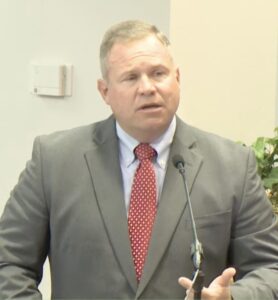
On the hot seat: Spencer Anderson
Spencer Anderson: Last week, you adopted your 2025 strategic plan. Specifically, you have adopted two board policy agenda items. One is a complete stormwater review, and this is the beginning of that. This is not a stormwater workshop where we’re going to come out of here and say we’re done. This is really just the beginning of a long journey to mitigate future flooding and improve water quality across the county. We have been doing that for a long time. This is an instance where we can have a new look at how we regulate and mitigate flooding in Sarasota County.
Ramon Lopez: That was Spencer Anderson, Sarasota County’s Director of Public Works, who on Tuesday was on the hot seat before the Sarasota County Commission’s special Stormwater Workshop.
What the county plans to do to avoid the severe flooding caused by Hurricane Debby was revealed during the first of a series of stormwater management workshops to be held by the county commissioners.
While no action plan came out of the initial session, Anderson presented potential regulatory and operational changes to the commissioners.
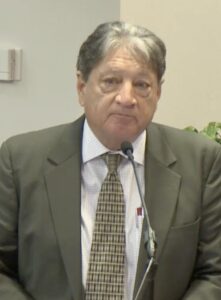
One of Steve Suau’s recommendations: Don’t build in the floodplain.
Also speaking at the initial workshop was stormwater engineer and hydrologist Steve Suau who was asked by Anderson to do an independent study to determine the cause of the unprecedented flooding from Hurricane Debby around the county.
Residents point to overdevelopment. Developers said the unprecedented volume of hurricane-produced rainfall was to blame. Local government officials point to the county’s longstanding stormwater regs and control systems.
The county adheres to what is often referred to as a 100-year storm threshold—of 10 inches of rain in a 24-hour period—to determine acceptable flooding. But Debby produced an 18-inch deluge, which the infrastructure could not handle.
At the hearing, Anderson provided the results of his analysis regarding what happened, and outlined what can be done to avoid similar severe flooding in the future.
Anderson was backed up by Suau at the workshop. His 10 recommendations are incorporated in Anderson’s 18 potential regulatory changes and 10 potential operational changes that the commissioners will now consider.
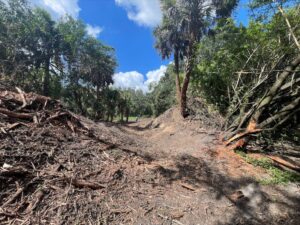
Cowpen Slough dike breach.
Key options proposed by Anderson and Suau include:
- Identify significant floodplain areas and protect them from development;
- clean stormwater streams on a regular basis;
- inspect dikes and levees with responsibility for their maintenance and upkeep established;
- and update the stormwater criteria set back in 1996 in the face of climate change and based on what science says.
Anderson said fixing the stormwater problem will take time.
SA: This is an excellent opportunity for us to take a look at what we’re doing. This is a marathon; it’s not a sprint. This is our first conversation of this, and it’s really important that we keep talking about this and start implementing changes that can have some benefit to the community. It’s been dry, and that’s where people have gotten comfortable for the past [three? 30?] years, is we haven’t had one of these big events. These storms, like we’ve mentioned several times, are exceeding our regulatory standards. Our level of service is what people are accustomed to developing to, and if the board wants us to revise those and make them more stringent, we can do that.
Next steps: We would like to come back for at least a second workshop to talk about those operations and regulatory changes. There may also be opportunity for us, when we get more insight on what projects might be available for us to incorporate, another series of workshops to talk about specific projects. We want to define the preferred regulatory and operational changes that the board wants to consider and then do a very thorough public and professional outreach campaign. We really need to get the public input on how these potential changes may impact various sectors of our community. Lastly, we want to implement those changes and start development to meet those new regulatory options.
RL: Newly elected Commissioner Tom Knight:
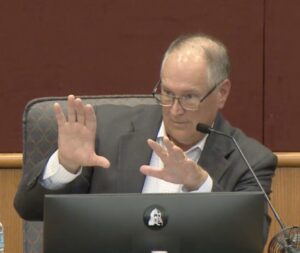
County Commissioner Tom Knight, during the workshop.
Tom Knight: I think we need to be very serious. We need to be bold and make some bold decisions because people are nervous about this summer coming. I think that we need to have the courage to do what we need to do right now and prioritize our infrastructure of our communities that exist, and I think that we need to bring that back sooner than later, and then a long-term strategic plan for all the other things. We have so many homeowners, HOAs—Alligator Creek, Hatchet Creek—all these other things that—I think we owe responsibility to these citizens, but I think the most important thing that we’ve got right now is Phillippi Creek, and I think that we need to be bold and come up with some ideas to come back and answer these questions with another workshop, and address the rest of it, too.
RL: Commissioner Mark Smith said the floodplains need protection.
Mark Smith: We obviously have got an issue with the maintenance of the stormwater facility—”facility” meaning the wetlands and things like that.
We’ve got to change the way we’re doing business as a county and be proactive. Don’t put us in a spot to begin with. There’s plenty of land. We have to build smart. We have to develop smarter. I know this kind of commission is very hard at any proposed development.
RL: Knight was followed by public speakers whose homes were flooded by the trio of hurricanes last year. They said the workshop was a good first step. Community activist Tom Matrullo, who is a WSLR board member, said the county commission must follow through.
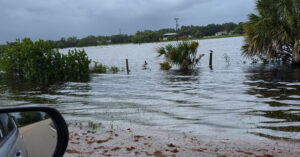
Flooding at Smith Farm near the Celery Fields after Hurricane Debby. Photo by Tom Matrullo.
Tom Matrullo: Please give Steve Suau’s recommendations your full attention and do all you can possibly do to implement them. Sarasota’s silence must end. We need a board that demands transparency of its staff in all matters. The effects of developer dominance must come to an end. Your flood examination can spark a new board vision. We look to you on your watch to turn this administration back to its primary concern: the health, safety, and welfare of your community.
RL: This is Ramon Lopez for WSLR News.
WSLR News aims to keep the local community informed with our 1/2 hour local news show, quarterly newspaper and social media feeds. The local news broadcast airs on Wednesdays and Fridays at 6pm.